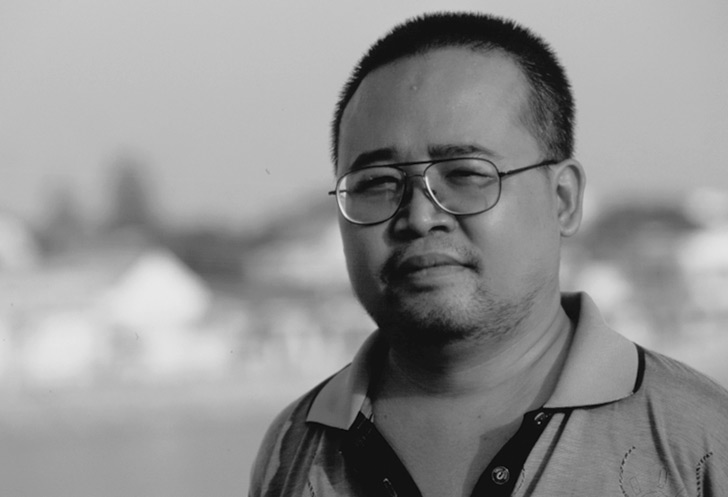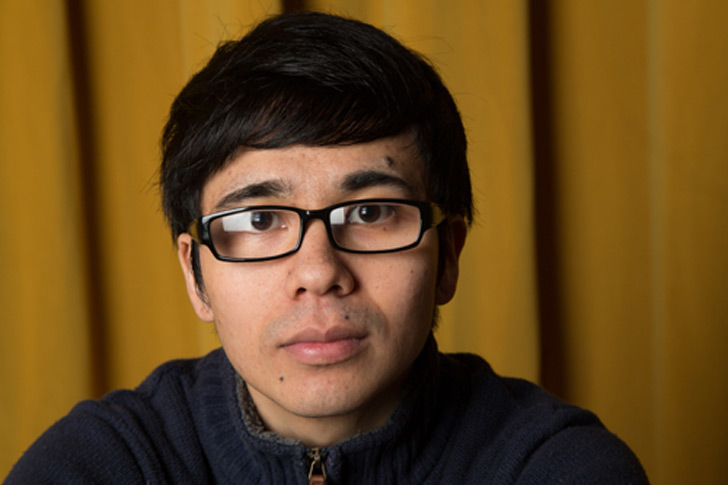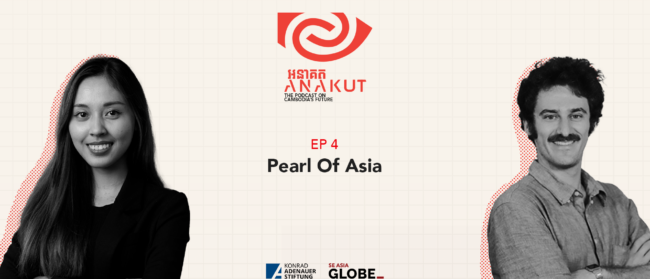“He was lying face down, his shirt burnt off, back steaming. I myself was bleeding. There was a harvest of vesicles on his back. His body wept.”
With these words, Linh Dinh thrusts his readers into a scene of utter desolation. Only a paragraph long, his poem, “The Most Beautiful Word”, forces us to confront the reality of a man left broken by gunfire. Cradling the injured man in his arms, the unnamed narrator is left scrabbling for the unreachable words that will make sense of the violence before him. “Don’t say, ‘The bullet yawed inside the body’,” he writes. “Say, ‘The bullet danced inside the body’.”
Born in what was then Saigon in 1963, Vietnamese-American poet Linh Dinh is no stranger to the language of cruelty. Fleeing to the US after Saigon fell to North Vietnamese forces in 1975, Dinh experienced firsthand the displacement and isolation that became the reality of tens of thousands of Vietnamese refugees desperate to escape the war and its aftermath. Settling in Philadelphia at age 11, Dinh’s first experiences of US life were ones of alienation and violence.
Films such as Apocalypse Now, Full Metal Jacket and Platoon have created a popular understanding of Vietnam where its people are relegated to faceless cyphers stalking chiselled GIs through the jungle
Today, Dinh describes the frustration of attempting to get often-overlooked Vietnamese voices heard in the West. “The challenge of making sense of Vietnamese history has preoccupied me since I was a teenager,” he said. “There is a fascination with the North Vietnamese soldier, and a complete disregard, if not disdain, of those from the South – but such is the fate of most historical losers.”
In the US, Dinh was caught between his own memories of a childhood in Saigon and the hostile warscape popularised in American culture. Films such as Apocalypse Now, Full Metal Jacket and Platoon have created a popular understanding of Vietnam where its people are relegated to faceless cyphers stalking chiselled GIs through the jungle.
Worse still for Dinh are the people who twist the conflict into a story simple enough to reinforce their own political prejudices. “Most people who comment on [the war] are facile and reductive. I can’t count how many times I’ve been lectured to by indignant and righteous Western morons on the Vietnam War.”
Travelling back to Vietnam in 1995 with the assistance of a Pew Centre Fellowship, Dinh sought out writers whose oeuvre didn’t fit in to the Vietnam portrayed in Western media. His first book, Night, Again, was a collection of works by previously unknown Vietnamese authors – many of them translated into English for the first time by Dinh himself.
“I wanted to show the range of Vietnamese writers as well as the fullness of the Vietnamese experience,” he said. “Vietnam in American fiction is almost exclusively about the Vietnam War, and much of the Vietnamese fiction that’s translated into English is also about that conflict.”
His return to Vietnam – the first of a number of trips back – gave Dinh the tools he needed to use his writing as a disruptive agent, cutting through the comfortable clichés of mass media with visceral images of a society in decay. “Being in Vietnam also allowed me to better understand the writer’s responsibility. [While] there, I met writers who had integrity and courage, and those who pandered. I also saw pressing social and political issues that had to be diagnosed and articulated by writers, since they’re the ones with the means to do so.”
In the US, an essay condemning the government for facilitating war crimes – a charge Dinh has consistently levelled against extra-legal drone strikes carried out by the Obama administration – can get a struggling fringe poet mainstream attention. In Vietnam, it simply wouldn’t be published.
It’s this freedom that allows Dinh to launch scathing critiques of a political climate that appals him. “With no ideological basis, Vietnam is just a one-party dictatorship where card-carrying ‘Communists’ accumulate wealth, send their kids to American colleges and take vacations in Singapore, Dubai and Paris,” he said.

Speaking of writers that he believes pander to the regime in return for easy publication, Dinh was frank in his contempt. “If you want to be a whore, there are much more lucrative fields to go into than writing.”
Dinh’s formative experience as an outsider in his own childhood is a common one among refugees.
Quang Phu Van teaches Vietnamese literature and language at the Council of Southeast Asia Studies at Yale University. Van said the children of refugees face a series of trials in their new homes.
“Historically, Asian voices have been marginalised in America and the attempt to express this marginalisation is, in itself, a challenge.”
Quang Phu Van
“One of the challenges is the sense of displacement and the need to express their experience,” he said. “The only way was to express it in their native language. They had to negotiate with the tensions between being ‘displaced’ – or the exilic experience – and a new notion of Americanness.”
“Many Vietnamese-American poets choose to express their experience in terms of displacement, fragmentation, voiceless[ness], loneliness and also their nostalgia for ‘home’.”
As Van points out, most face an uphill struggle. “Historically, Asian voices have been marginalised in America and the attempt to express this marginalisation is, in itself, a challenge.”
One of the most powerful emerging voices among Vietnamese-American poets is Ocean Vuong. Now living in New York City, Vuong moved to the US from Saigon at the age of two. The winner of the 2016 Whiting Award for emerging writers, Vuong writes with heart-wrenching fragility on his own desire to belong. His first collection of poetry, Night Sky with Exit Wounds, was released in April.

In “Aubade with Burning City”, featured in the February-April issue of Mekong Review, Vuong paints a dreamlike image of Saigon moments before the North Vietnamese break through the walls. As the melody of Irving Berlin’s “White Christmas” echoes through the streets to signal the final evacuation of American civilians, Vuong instead drags our gaze to those left behind: “The treetops glisten and children listen, the chief of police/facedown in a pool of Coca-Cola/A palm-sized photo of his father soaking/beside his left ear.”
The poem’s last lines echo the grainy black-and-white photos of dying Vietnamese people that were instrumental in galvanising the anti-war movement in the US. “In the square below: a nun, on fire/runs silently toward her god/Open, he says/She opens.”
In an interview with book publisher Well&Often, Vuong stressed the importance of avoiding easy interpretations of a country rendered almost invisible by the weight of its mythology. “I think a lot of younger writers, especially those who were not born or [have not] lived in Vietnam, are more susceptible to depicting Vietnam as a convenient and often limiting trope, replete with palm trees, rice paddies, buffaloes, the one-legged farmer hobbling along a dirt road, etcetera,” he said. “Vietnam becomes less of a real, lived country and more of a collection of icons which the poet uses to mend whatever personal and political agenda he’s negotiating.”
In a correspondence with Chinese-American poet Arthur Sze published through an Asian-American Literary Review mentorship programme, Vuong writes warmly of the importance of poetry in creating a place to call home.
“I am starting to think that to be an Asian-American is to build one’s own nation – within one’s body,” he wrote. “And maybe my best tools happen to be words and language… Through language, my nation remains malleable, ever changing and borderless. My citizens are words and words belong to all who use them.”
For many poets, though, this nation remains elusive.
As the dying man is turned over in “The Most Beautiful Word”, we see the “collapsed face” of a person robbed of his identity by unimaginable violence. By the poem’s abrupt end, it becomes clear just how much has been taken.
“I extracted a tooth from the tongue. He had swallowed the rest.”


